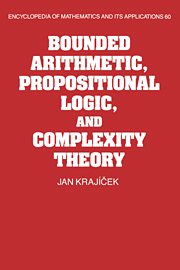Book contents
- Frontmatter
- Contents
- Preface
- Acknowledgments
- 1 Introduction
- 2 Preliminaries
- 3 Basic complexity theory
- 4 Basic propositional logic
- 5 Basic bounded arithmetic
- 6 Definability of computations
- 7 Witnessing theorems
- 8 Definability and witnessing in second order theories
- 9 Translations of arithmetic formulas
- 10 Finite axiomatizability problem
- 11 Direct independence proofs
- 12 Bounds for constant-depth Frege systems
- 13 Bounds for Frege and extended Frege systems
- 14 Hard tautologies and optimal proof systems
- 15 Strength of bounded arithmetic
- References
- Subject index
- Name index
- Symbol index
10 - Finite axiomatizability problem
Published online by Cambridge University Press: 02 December 2009
- Frontmatter
- Contents
- Preface
- Acknowledgments
- 1 Introduction
- 2 Preliminaries
- 3 Basic complexity theory
- 4 Basic propositional logic
- 5 Basic bounded arithmetic
- 6 Definability of computations
- 7 Witnessing theorems
- 8 Definability and witnessing in second order theories
- 9 Translations of arithmetic formulas
- 10 Finite axiomatizability problem
- 11 Direct independence proofs
- 12 Bounds for constant-depth Frege systems
- 13 Bounds for Frege and extended Frege systems
- 14 Hard tautologies and optimal proof systems
- 15 Strength of bounded arithmetic
- References
- Subject index
- Name index
- Symbol index
Summary
This chapter surveys the known facts about the
Fundamental problem. Is bounded arithmetic S2 finitely axiomatizable?
As we shall see (Theorem 10.2.4), this question is equivalent to the question whether there is a model of S2 in which the polynomial time hierarchy PH does not collapse.
Finite axiomatizability ofSandT
In this section we summarize the information about the fundamental problem that we have on the grounds of the knowledge obtained in the previous chapters.
Theorem 10.1.1. Each of the theories S and T is finitely axiomatizable for i ≤ 1.
Proof. By Lemma 6.1.4, for i ≤ 1 there is a formula UNIVi(x, y, z) that is a universal formula (provably in). This implies that and, i ≤ 1, are finitely axiomatizable over.
To see that is also finitely axiomatizable, verify that only a finite part of is needed in the proof of Lemma 6.1.4.
The next statement generalizes this theorem.
Theorem 10.1.2. Let 1 ≤ and 2 ≥ j. Then the set of the consequences of
is finitely axiomatizable.
The sets and are also finitely axiomatizable.
Information
- Type
- Chapter
- Information
- Bounded Arithmetic, Propositional Logic and Complexity Theory , pp. 185 - 209Publisher: Cambridge University PressPrint publication year: 1995
